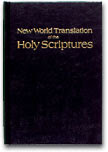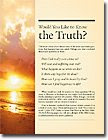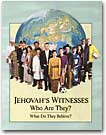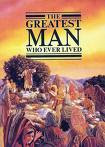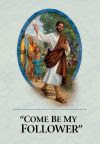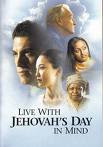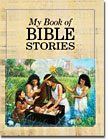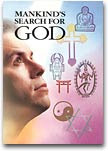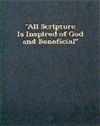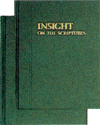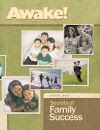"But the prophet, which shall presume to speak a word in my name, which I have not commanded him to speak, or that shall speak in the name of other gods, even that prophet shall die. And if thou say in thine heart, How shall we know the word which the LORD hath not spoken? When a prophet speaketh in the name of the LORD, if the thing follow not, nor come to pass, that is the thing which the LORD hath not spoken, but the prophet hath spoken it presumptuously: thou shalt not be afraid of him."-Deuteronomy 18:20-22, King James Version
If a prophet makes a false prophecy, then they are deserving of death. How can you know when someone has made a prophecy? "When a prophet speaketh in the name of the LORD." Yes, there is a difference between a prediction and a prophecy although many will argue that the line is thin. Even if that is so, the line is still there and maybe not as thin as many may think.
Take two examples from the Bible. One is a true prophet and one is a false prophet. Both made mistakes but only one was worthy of death.
The first is Nathan, a true prophet. The Bible says:
"And it came about that, when the king dwelt in his own house and Jehovah himself had given him rest from all his enemies round about, then the king said to Nathan the prophet: 'See, now, I am dwelling in a house of cedars while the ark of the true God is dwelling in the middle of tent cloths.' Upon that Nathan said to the king: 'Everything that is in your heart—go, do, because Jehovah is with you.'
"And it came about on that night that the word of Jehovah came to Nathan, saying: 'Go, and you must say to my servant David, "This is what Jehovah has said: 'Should you yourself build me a house for me to dwell in? For I have not dwelt in a house from the day of my bringing the sons of Israel up out of Egypt to this day, but I was continually walking about in a tent and in a tabernacle..."
"'...And Jehovah has told you that a house is what Jehovah will make for you. When your days come to the full, and you must lie down with your forefathers, then I shall certainly raise up your seed after you, which will come out of your inward parts; and I shall indeed firmly establish his kingdom. He is the one that will build a house for my name, and I shall certainly establish the throne of his kingdom firmly to time indefinite."-2 Samuel 7:1-6, 11-13
Nathan here made a prediction and, even though a prophet, was not executed as if he had made a false prophecy. This shows that people can make predictions about the future and not be false prophets.
A striking feature of false prophets is that they claim to have some type of divine revelation. Take Hananiah for example.
"Then it came about in that year, in the beginning of the kingdom of Zedekiah the king of Judah, in the fourth year, in the fifth month, that Hananiah the son of Azzur, the prophet who was from Gibeon, said to me in the house of Jehovah before the eyes of the priests and of all the people: 'This is what Jehovah of armies, the God of Israel, has said, "I will break the yoke of the king of Babylon. Within two full years more I am bringing back to this place all the utensils of the house of Jehovah that Nebuchadnezzar the king of Babylon took from this place that he might bring them to Babylon."' And '"Jeconiah the son of Jehoiakim, the king of Judah, and all the exiles of Judah who have come to Babylon I am bringing back to this place," is the utterance of Jehovah, "for I shall break the yoke of the king of Babylon."'...At that Hananiah the prophet took the yoke bar from off the neck of Jeremiah the prophet and broke it. And Hananiah went on to say before the eyes of all the people: "This is what Jehovah has said, 'Just like this I shall break the yoke of Nebuchadnezzar the king of Babylon within two full years more from off the neck of all the nations.' And Jeremiah the prophet proceeded to go his way."-Jeremiah 28:1-4, 10-11
Hananiah was later put to death by Jehovah for being a false prophet. (Jeremiah 28:15-17) Nathan was not put to death. This showed that not all predictions are prophecies and are not warranting death nor do they warrant the person being ignored.
What Jehovah's Witnesses do is look into the Bible, find what it says, study any chronology, and then tell us when something is going to happen based on their studies. This is no different then what the prophet Daniel did. The Bible says, "In the first year of Darius the son of Ahasuerus of the seed of the Medes, who had been made king over the kingdom of the Chaldeans; in the first year of his reigning I myself, Daniel, discerned by the books the number of the years concerning which the word of Jehovah had occurred to Jeremiah the prophet, for fulfilling the devastations of Jerusalem, namely, seventy years." (Daniel 9:1-2) Daniel was not given divine revelation but followed the same course as Jehovah's Witnesses. He studied the available Scriptures and was able to ascertain when certain events would take place. In this way he was able to see when the Jews would return to Jerusalem.
The biggest question that deserves an answer and which will be key in determining the status of Jehovah's Witnesses as false prophets or not is if they claim to be prophets. Have they ever said, "This is what Jehovah has said" or "The utterance of Jehovah is"? If they have and their prophecy did not come true, then they are indeed false prophets. Have they claimed divine inspiration? Let us look at some of their past statements.
"We have not the gift of prophecy."
-Zion’s Watch Tower, January 1883, page 425
"Nor would we have our writings reverenced or regarded as infallible, or on a par with the holy Scriptures. The most we claim or have ever claimed for our teachings is that they are what we believe to be harmonious interpretations of the divine Word, in harmony with the spirit of the truth. And we still urge, as in the past, that each reader study the subjects we present in the light of the Scriptures, proving all things by the Scriptures, accepting what they see to be thus approved, and rejecting all else. It is to this end, to enable the student to trace the subject in the divinely inspired Record, that we so freely intersperse both quotations and citations of the Scriptures upon which to build."
-Zion's Watch Tower and Herald of Christ's Presence, 15 December 1896, page 2080
"It is not our intention to enter upon the role of prophet to any degree, but merely to give below what seems to us rather likely to be the trend of events—giving also the reasons for our expectations."
-Zion's Watch Tower and Herald of Christ's Presence, 1 March 1904, page 3327
"Many students have made the grievous mistake of thinking that God has inspired men to interpret prophecy. The holy prophets of the Old Testament were inspired by Jehovah to write as his power moved upon them. The writers of the New Testament were clothed with certain power and authority to write as the Lord directed them. However, since the days of the apostles no man on earth has been inspired to write prophecy, nor has any man been inspired to interpret prophecy."
-From the book "Prophecy" Brooklyn: Watchtower Bible and Tract Society, 1929, pages 61-62
"The Watchtower does not claim to be inspired in its utterances, nor is it dogmatic. It invites careful and critical examination of its contents in the light of the Scriptures."
-The Watchtower, 15 August 1950, pages 262-263
Obviously, Jehovah's Witnesses have never claimed to have any divine revelation from God in what they write or teach. Like Daniel, though, they have searched the Scriptures to see what the Bible says will happen. Sometimes they have misinterpreted certain Scriptures but then again, who hasn't?
Many religious groups have made "prophecies"--actually, predictions--of things that would occur, some even giving specific dates. These include Lutherans, Baptists, Anabaptists, Presbyterians, Mormons, Assemblies of God, the Anglican Church, Catholics, and more. Jehovah's Witnesses are not the only group who have ever made predictions based on their understanding of Bible text that proved to be wrong. However, many lay more blame on Jehovah's Witnesses then any other religious group due to the fact that they hate us, thinking of us as a unorthodox.
Some argue that Jehovah's Witnesses have gotten too specific, choosing certain dates as the return of Christ. To them, this is what characterizes us as a cult? Well, look at three people who predicted times for the return of Christ who are well respected religious leaders.
"1836 [will be] the end of the non-chronos, and of the many kings; the fulfilling of the word, and of the mystery of God; the repentance of the survivors in the great city; the end of the 'little time,' and of the three times and a half; the destruction of the east; the imprisonment of Satan."
-John Wesley Wesley's Notes of the Bible, written throughout his life, 1703-1791
"I sincerely believe that the Lord draweth nigh. We may have another year, maybe two years, to work for Jesus Christ, and, Ladies and Gentlemen, I believe it is all going to be over ... two years and it’s all going to be over."
-Billy Graham, 1950 at a rally in Los Angeles, California
"Christ has given a sign by which one can know when the Judgment Day is near. When the Turk will have an end, we can certainly predict that the Judgment must be at the door."
-Martin Luther
Martin Luther, Billy Graham, and John Wesley were not false prophets. They did make predictions based on their interpretation of the Bible that turned out to not be true but that does not make them guilty of false prophecy. They are guilty, though, of making these things seem as if they were without a doubt.
Jehovah's Witnesses, on the other hand have always told people that their interpretations of events could be wrong.
"We are not prophesying; we are merely giving our surmises . . . We do not even aver that there is no mistake in our interpretation of prophecy and our calculations of chronology. We have merely laid these before you, leaving it for each to exercise his own faith or doubt in respect to them."
-Regarding 1914: Zion's Watch Tower, January 1, 1908, page 4110
"The year 1925 is here. With great expectation Christians have looked forward to this year. Many have confidently expected that all members of the body of Christ will be changed to heavenly glory during this year. This may be accomplished. It may not be. In his own due time God will accomplish his purposes concerning his people. Christians should not be so deeply concerned about what may transpire this year."
-Regarding 1925: The Watch Tower, January 1, 1925, page 3
"'What about the year 1975? What is it going to mean, dear friends?' asked Brother Franz. 'Does it mean that Armageddon is going to be finished, with Satan bound, by 1975? It could! It could! All things are possible with God. Does it mean that Babylon the Great is going to go down by 1975? It could. Does it mean that the attack of Gog of Magog is going to be made on Jehovah’s witnesses to wipe them out, then Gog himself will be put out of action? It could. But we are not saying. All things are possible with God. But we are not saying. And don’t any of you be specific in saying anything that is going to happen between now and 1975.'"
-The Watchtower, 15 October 1966, page 631
If Jehovah's Witnesses have never falsely prophesied, why do people treat them so bad? These people are against any belief system that does not conform to theirs. Many of these people know better, they know that Jehovah's Witnesses have never made false prophecies but they attack them anyway. These people, called apostates, used to be Jehovah's Witnesses and then stopped for various reasons. These then turn around and attack us--sometimes physically! Why? I do not know. However, Brother Charles Russell said it best:
"All who cut loose from the Society and its work, instead of prospering themselves or upbuilding others in the faith and in the graces of the spirit, seemingly do the reverse--attempt injury to the Cause they once served, and, with more or less noise, gradually sink into oblivion, harming only themselves and others possessed of a similarly contentious spirit...But while we are willing that others should go anywhere and everywhere to find food and light to their satisfaction, strange to say, those who become our opponents take a very different course. Instead of saying in the manly fashion of the world, 'I have found something which I prefer; goodbye!' these manifest anger, malice, hatred, strife, 'works of the flesh and of the devil' such as we have never known worldly people to exhibit. They seem inoculated with madness, Satanic hydrophobia [rabies]...They are ready to say and write contemptible falsities and to stoop to do meanness."
We as Jehovah's Witnesses try to take this with a grain of salt, knowing that our Lord and Savior, Jesus Christ said, "Happy are you when people reproach you and persecute you and lyingly say every sort of wicked thing against you for my sake. Rejoice and leap for joy, since your reward is great in the heavens; for in that way they persecuted the prophets prior to you." (Matthew 5:11-12) No matter what people say, Jehovah's Witnesses are not false prophets.



